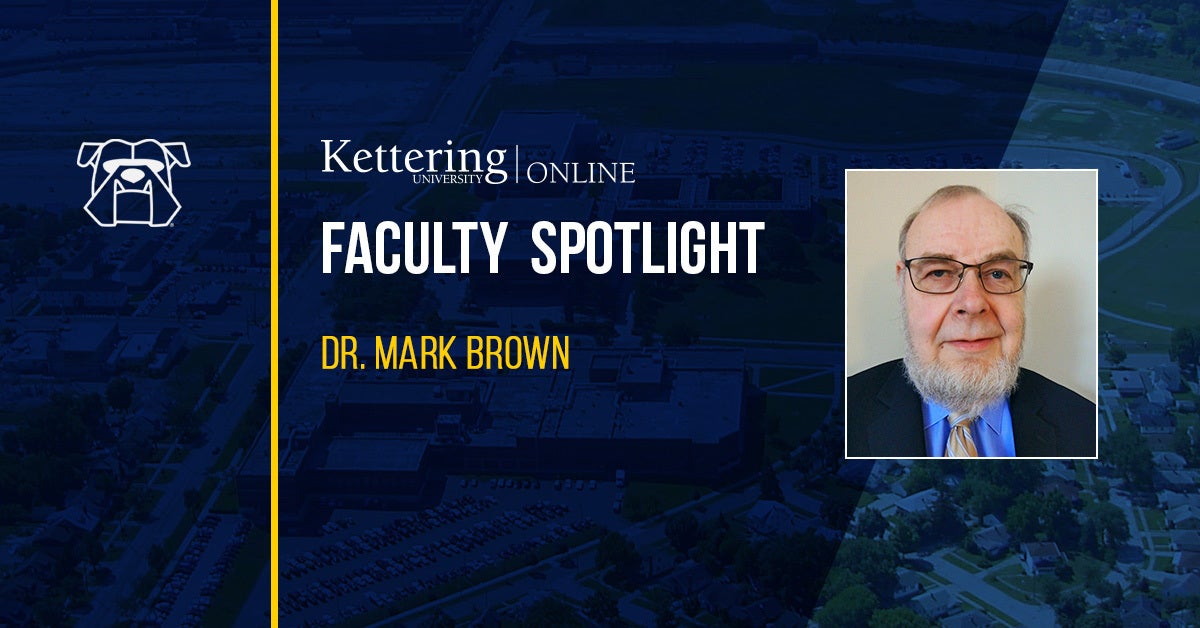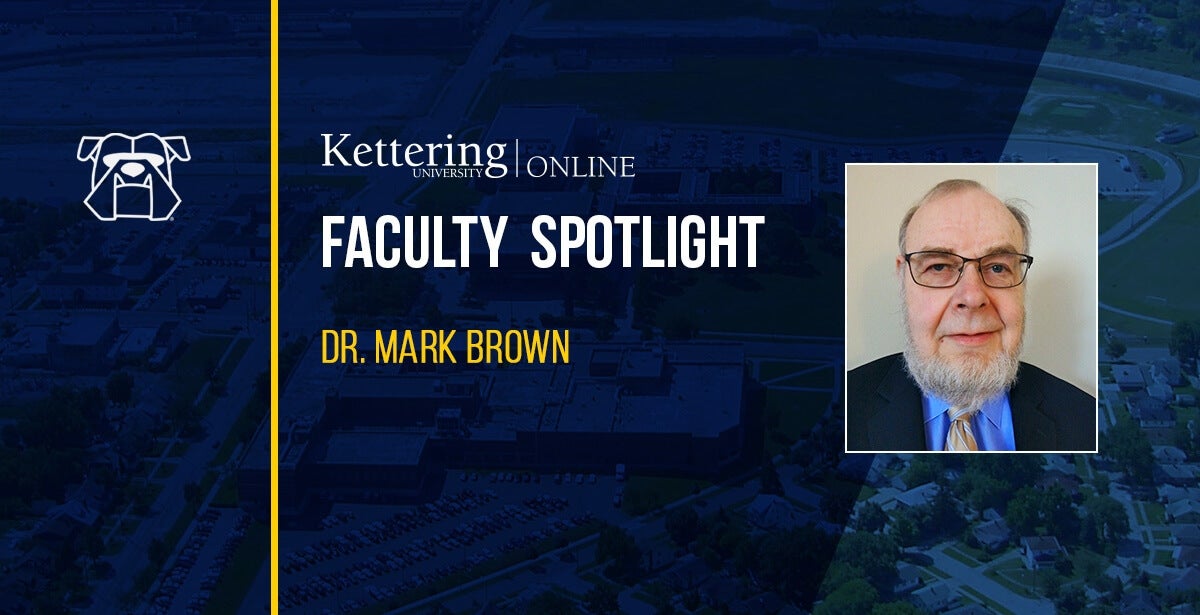
Faculty Spotlight: Dr. Mark Brown
As Kettering University Online’s (KUO) Program Development Manager, I have the pleasure of working with Contributing Faculty members. Coming from a wide range of educational, career, and geographical backgrounds, KUO faculty unite in the effort to link transformative experiential education to rigorous academic standards, with real-world applications for learning that lasts a lifetime.
This time, we are happy to shine the Faculty Spotlight on Dr. Mark Brown, who teaches the Integrative Capstone Project course in KUO’s MS Lean Manufacturing program. This program, the only one of its kind, was developed in partnership with G.M. The faculty, are experts in their field, having both Black Belts and Master Black Belts, and have saved millions of dollars for companies across various industries.
Following are excerpts from our conversation:
JL: Thank you so much for taking the time to chat!
MB: My pleasure. Thanks for inviting me!
JL: The first question I typically ask is where did you grow up.
MB: I grew up in Massachusetts – in Worcester.
JL: Which degrees do you have and from where?
MB: In 1970, I received my bachelor’s degree, in Chemical Engineering, from the Worcester Polytechnic Institute and in 1977, I earned my Ph.D., also in Chemical Engineering, from the University of Minnesota in Minneapolis.
JL: I’m curious about why people choose their field of study. More specifically, you are an expert in Lean. What drew you to that methodology?
MB: There are two specific experiences at the foundation of my awareness of Lean. The first, was when I did some consulting work with Saturn and was introduced to their management philosophy. The second, was the work and teaching of Genichi Taguchi. Taguchi is famous for his pioneering methods of modern quality control. More specifically, he created the Taguchi Method, which seeks to improve product quality at the design stage. Taguchi was able to integrate quality control right into the product design by using both experimental and statistical analysis.
JL: That is so interesting! I know that you have a Black Belt in Lean. Can you explain what the colored belt system is in Lean?
MB: Sure, much like in karate, the belt color in Lean is a hierarchical system which designates a certain level of knowledge. There is yellow, green, and black, Then, there is a Master Black Belt. I have a Master Black Belt which means I am certified to teach and apply Design for Six Sigma and The Toyota Production System.
JL: Two of the driving concepts of Lean are the idea of waste and the goal of continuous improvement. An you talk a bit about each of these?
MB: Sure. Lean is based on the Toyota Production System which is a 4P model. The four P’s stand for Philosophy, Process, People and Partners, and Problem Solving). It has taken Toyota roughly 40 years to implement. Within that, there are the ideas of waste and continuous improvement. Waste just means getting rid of any action or process that doesn’t ultimately add value to the customer experience. In Lean there are seven kinds of waste: overproduction, inventory, defects, motion, over-processing, waiting, and transportation. Continuous improvement means just that – efforts made towards eliminating variability and improving predictability in products, services, and organizations. When organizations employ continuous improvement they are streamlining workflows, and other processes, which reduces both time and effort. The cumulative effects of these initiatives saves companies both time and effort, ideally leading to greater profits!
JL: I’m curious, how transferable are Lean skills between industries?
MB: Oh very! The Lean philosophy is being used in all kinds of industries besides manufacturing. It is being used in health care, education, construction, and government just to name a few. Also Lean can be used in the service industry.
JL: I’d like to shift gears a bit and talk about your teaching and your students. What is your teaching philosophy?
MB: I practice a four-step approach, regardless of who I am teaching. The first step is to present a theory, method, or tool. Then, I give the learner a chance to practice those in class. The third step involves expecting and encouraging learners to apply those tools, and what they have learned, in a “real-word” situation. Finally, I review with the learner the results of their application.
JL: That approach is so much in line with what we do at Kettering University Online which is summed up in our motto: “Learn Today-Use Tomorrow.” As you know, we encourage students to bring ideas and challenges from their workplace as well as bring what they are learning from KUO to their workplace!
JL: How would you describe your Kettering students?
MB: I would say my students are really motivated. They are also eager to share their experiences with me and their fellow learners.
JL: If you think back to when you were a student, what would you say was the best piece of advice you ever received from a professor?
MB: The first was very simple – be open to new ways of learning. The second, I think about often when I am hiring people. A professor once told me to count the number of “I’s” used in an interview. If a candidate has too many, don’t hire them!
JL: What advice would you give to a learner who is taking their first online course?
MB: I would say remember to learn from others and share with others.
JL: Are there any particular career achievements or highlights you would like to share?
MB: Yes! I helped Saturn start their manufacturing systems one year sooner than planned and I also transformed two manufacturing companies to Lean Six Sigma and Design for Six Sigma.
JL: Finally, I know how busy you are, but what are some of the fun things you like to do in your spare time?
MB: I love to read and visit with my grandchildren. I also love photography!
KUO honors and appreciates Dr. Mark Brown for his contributions and highly regarded work with learners.
The Master of Science Lean Manufacturing degree from Kettering University Online, provides you with the tools, techniques, and strategies necessary to leverage both processes and people so that you can play a direct role in helping your organization reach its strategic goals while boosting your career trajectory. In this program you:
- become an expert in Lean Six Sigma.
- engage with the latest research.
- develop expertise to manage cross-functional teams.
- improve process by applying the (DMAIC) method – Define, Measure, Analyze, Improve and Control).
- evaluate and apply quality philosophy.
- increase your competitive edge!
If you are interested in becoming a student, visit Kettering University Online and connect with an Enrollment Advisor for information about our graduate degree programs. Our programs are 100%online, ideal for busy working professionals! Also learn how you can customize your degree with a choice of Graduate Certificates in: Global Leadership, Healthcare Management, Operations Management, or Supply Chain.
If you are interested in corporate, professional and/or continuing education opportunities through Kettering Global X, please consult our catalog at https://globalx.kettering.edu/pages/course-catalog-print.

